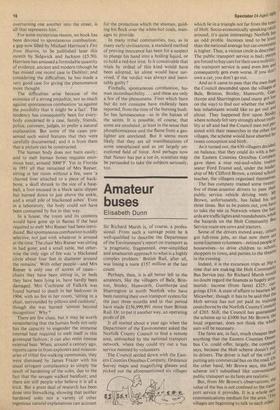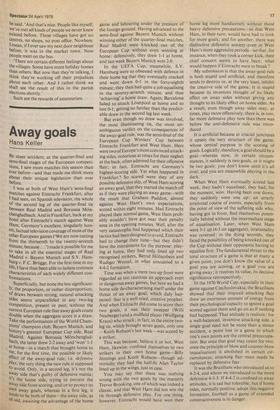Amateur buses
Elisabeth Dunn
Sir Richard Marsh is, of course, a professional. From such a vantage point he i§ well-qualified to describe the Department of the Environment's report on transport as 'a pragmatic, fragmented, over-simplified and amateurish approach to what is a highly complex problem.' British Rail, after all, was losing a mere £157 million at the last count.
Perhaps, then, it is all better left to the amateurs, like the villagers of Bale, Brinton, Stodey, Hunworth, Gunthorpe and Sharrington in north Norfolk who have been running their own transport system for the past three months and in that period have made £156,999,991 more than British Rail. Or, to put it another way, an operating profit of £9.
It all started about a year ago when the Department of the Environment asked the Norfolk County Council to find a remote area, untouched by the national transport network, where they could try out a bus service manned by volunteers.
The Council settled down with the Eastern Counties Omnibus Company, Ordnance Survey maps and magnifying glasses and picked out the aforementioned six villages
which lie in a triangle not far from the town of Holt. Socio-economically speaking (stick around, it's quite interesting) Norfolk has an odd profile. Incomes tend to be lower than the national average but car-ownershiP is higher. Thus, a vicious circle is described' The public transport service is bad; peoPle are forced to buy cars for their own mobilltY,' the transport service is used even less an° consequently gets even worse. If you don t own a car, you don't go out. And so it came to pass that the men frog!. the Council descended upon the villages °I Bale, Brinton, Stodey, Hunworth, GU thorpe and Sharrington (and many got loSt on the way) to find out whether the wheel,: less inhabitants would like to get out an about. They happened first upon Stade?' where nobody felt very strongly about mobi' lity at all and had the Council men not Per' sisted with their researches in the other five villages, the scheme would have aborted be' tween conception and birth. As it turned out, the 630 villagers decided, on balance, that they could do with a bus' the Eastern Counties Omnibus ComPallY gave them a nice red-and-white twelve' seater Ford Transit and, under the leads ship of Mr Clifford Brown, a retired school' teacher, the villagers organised themselves' The bus company trained some twentr five of these amateur drivers to pass th.,eir public service vehicle driving tests. mr Brown, unfortunately, has failed his test three times. But as he points out, you have to take the test in Norwich where the ards are traffic lights and roundabouts, whue the hazards on the Holt Community 13115 Service route are cows and tractors.
Some of the drivers moved away, others got full-time jobs, so that now there are some fourteen volunteers—retired peoPle housewives—to drive children to school, shoppers to town, and parties to the theatre in the evening. Indeed, it is the excursion trips at 50p. 3 time that are making the Holt Communi,t,Y1 Bus Service pay. Sir Richard Marsh wool no doubt regard the finances as hugely afro' teurish: income (from fares) £325; 0. ,ut: goings £316. A state of affairs to hearten Micawber, though it has to be said that the Holt service has not yet paid its training costs (borne by the Norfolk County Council), of £265. Still, the Council has guaranteeu the scheme up to £1000 but Mr Brown, tile local organiser, does not think the whole sum will be necessary. The fares are, in fact, much cheaper the.° anything that the Eastern Counties °Mill: bus Co. could offer, largely, the comittliV says, because the Holt scheme doesn't P3Yt. , its drivers. The driver is half of the cost ° putting any commercial bus on the road. 011 the other hand, Mr Brown says, the 11°i; scheme isn't subsidised like convention public transport so its fares are realistic. But, from Mr Brown's observations, tile value of the bus is not confined to the transport service it provides. It is a whole fleVI communications medium for the area. *Tbe. villages are beginning to talk to each other'
he said. 'And that's nice. People like myself, we've met all kinds of people we never knew existed before. These villages have got no centres, no shops, no post office. Nowhere. I mean, if I ever saw my next door neighbour before, it was in the market town. Now people meet on the bus.
'There are certain different feelings about the villages. Some have more holiday homes than others. But now that they're talking, I think they're working off their prejudices about each other. And I rather think we shall see the result of this in the parish elections shortly.'
Such are the rewards of amateurism.



































 Previous page
Previous page